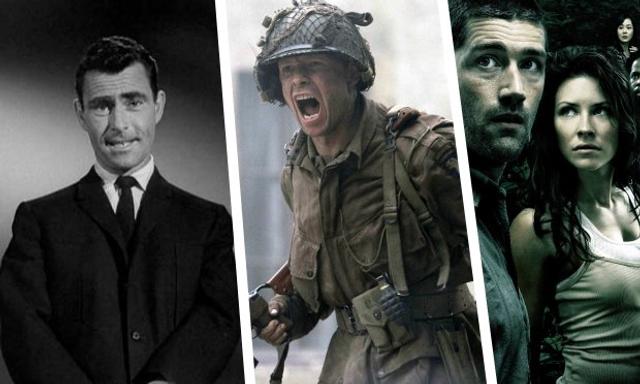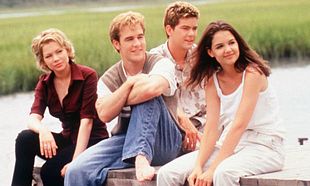Although television has been around since the '30s, it's only really began to have an impact on society in the '50s and '60s.
Now, television is a part of daily life and has helped to innovate and change how we see the world. It's not just all news reporting, however. Scripted television has challenged and defined how we see the world around us more than any other medium we have at our disposal today.
There's been many innovative and pioneering TV shows down through the years, but we've managed to whittle it down to just nine.
Take a look.
9. BAND OF BROTHERS
Although we might look at the likes of Game of Thrones or Marco Polo with its huge budgets and massive, spectacle-based storytelling, it's not all that recent. Throughout the '80s, shows like Dynasty and North & South put together larger-than-life episodes, however it wasn't until 2001's Band Of Brothers that the line between television and films truly blurred. With the help of Steven Spielberg and Tom Hanks, as well as a hugely talented cast of then-unknowns, Band of Brothers kicked off the era of prestige television. Hugely successful during its run, Band of Brothers pioneered the idea that well-made, spectacle-driven, complex storytelling could work on television.
8. FATHER TED
Although Irish television has had a fruitful history of comedy, with the likes of Hall's Pictorial Weekly, the Live Mike and some others, there had been almost no shows that skewered Irish society so well and, more specifically, reached a wider audience beyond our shores. Father Ted became an instant cultural phenomenon upon its arrival on Channel 4 and catapulted Ardal O'Hanlon, Dermot Morgan, Pauline McLynn and Frank Kelly into the popular consciousness. What made it so different was the fact that there had rarely been a TV show like it had that captured the surreal nature of Irish life, purposefully making itself weirder with each passing episode but still hugely familiar. More than anything, Father Ted put Irish comedy on the map.
7. LOST
Like Band of Brothers, JJ Abrams' Lost took high-end production values and then attempted to funnel them into a medium that was known for making things cheap and fast. However, where Lost truly broke the mould was in its use of the Internet as an extension of the series. Specifically, Lost was the first to use viral marketing to promote itself between seasons. An alternate-reality game, known as the Lost Experience, was commissioned, which saw players trying to piece together clues about the show and visiting specific websites to understand what was happening in the show. Lost, as we know, was replete with intricate and often baffling storylines, something that the Lost Experience and its viral marketing capitalised on.

6. SEINFELD
When you pull away the layers in the likes of, say, Friends or Cheers, there's an arc to each season and it all means something. Friends stick together no matter what and so on. With Seinfeld, the show was about nothing. The characters weren't exactly friends, they were more heaped together by circumstance. They didn't grow as people, they didn't come away with a lesson learnt in each episode. It was an endless loop of mundane, everyday things. People went to work, they shopped, they ate. On it went. Shows like It's Always Sunny In Philadelphia might now nod to this, but Seinfeld was the first to acknowledge the fact that its show was pointless. In fact, the behind-the-scenes mantra on Seinfeld for its writer was breathtakingly simple - "no hugging, no learning."
5. BIG BROTHER
Big Brother may have degenerated into something awful, but on its arrival from Holland, Big Brother was an experiment. The very idea of putting real people in a house and surrounding them with cameras had never been done in a serious format before. It was as much a psychological experiment as it was a sitcom. The cast of unusual characters, drawn from a public who had never before heard of the phrase 'reality TV star', made the show what it was and the uncompromising nature of it all - cameras on them, 24 / 7, made for some fascinating moments in television.
4. THE SOPRANOS
Although some TV shows had brushed with the idea of placing an anti-hero out in front and centre, no TV show fully committed to it in the way that The Sopranos did. From the very first episode, The Sopranos broke new ground like no other television show before it. James Gandolfini, in a career-defining performance, was incredible as mobster Tony Soprano and the show became a cultural institution in its time. Indeed, The Sopranos set off a string of other prestige shows like Breaking Bad and The Wire which dared to put anti-heroic, almost villainous characters out in front instead of copping to the usual expectations. With The Sopranos, it first showed that a television series could be nuanced, adult and be provocative.
3. THE LATE LATE SHOW
It's easy to be dismissive of The Late Late Show in its current format, but you have to remember that it's one of the longest running late-night talk shows in television history. Moreover, the Late Late Show helped to shape the national debate in Ireland with regards to sex, marriage, divorce and just about everything else in between. Gay Byrne and the Late Late Show were regularly the target of Catholic conservatives, with repeated calls by bishops for the Late Late Show to be cancelled as it was considered prurient and filth. The show's frankness with taboo subjects, its willingness to discuss topics that weren't openly spoken of, made it unmissable television for its time.
2. THE TWILIGHT ZONE
It stands to The Twilight Zone's effectiveness that almost sixty years on from its original broadcast, it still holds up impressively well. The ability to underline and expose controversial subjects on television - racism, sexism, nuclear war, environmental disasters - was borne out of necessity. Rod Serling, the narrator and creator of The Twilight Zone, had been met with consistent and constant rejection when it came to approaching topical subjects in his earlier works. Reasoning that TV execs would be more willing to accept his ideas if they were covered in horror and sci-fi, Serling created The Twilight Zone and changed the course of television history. Without The Twilight Zone, there'd be no Black Mirror, no Lost and certainly no...

1. STAR TREK
Its hard to understate just how much of an impact Star Trek had on both television and on our current culture. Mobile phones, for one, wouldn't be a reality without Star Trek. The series is responsible for inspiring the careers of millions - literally, millions - of scientists, engineers and researchers and has done more to promote science than any other television series before or after its initial run. As well as this, Star Trek was also responsible for the first interracial kiss ever broadcast on television. The scene, which saw Lt. Uhuru and Capt. Kirk embrace (albeit whilst under the mind control of aliens), was a source of huge contention for NBC. They demanded that two versions of the scene be shot - one with the kiss and one without. However, both Nichelle Nichols and William Shatner flubbed the scene to ensure that the kiss made it through. Despite the initial fear, the scene was met with a hugely positive response from fans and viewers, receiving the largest batch of fanmail in the series' history.










































































